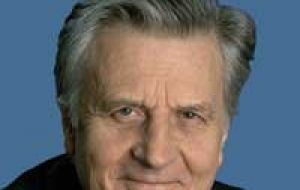MercoPress. South Atlantic News Agency
Euro-zone countries “need bold measures to improve confidence”
 ECB Jean Claude Trichet anticipates recovery will be “bumpy”
ECB Jean Claude Trichet anticipates recovery will be “bumpy” The European Central Bank left interest rates on hold at their historic low of 1% at its first meeting for the year Thursday amid concerns about Greece's debt crisis.
Speaking at a press conference, ECB chief Jean-Claude Trichet firmly rejected suggestions that Greece might be forced to leave the 16-member Euro-zone, telling a press conference that he would “not comment on absurd hypotheses.”
Trichet went on to say: “No government, no state can expect any special treatment” in dealing with a crisis in their state finances.
“There is a lot of hard work to do”, the ECB chief said, including moves to wind back the anti-recessionary fiscal measures introduced across the Euro-zone over the last year.
“It is very important for some nations, for their prosperity and recovery to take their own bold and courageous measures to improve confidence,” Trichet told the press conference which followed the meeting of the bank's 22-member rate-setting council.
In line with economists' expectations that the Frankfurt-based ECB will leave borrowing costs on hold well into 2010, Trichet gave no sign that the bank might soon start preparations for a rate change.
He said “the recovery process is likely to be uneven and that the outlook remains subject to uncertainty.” Inflationary pressures, he said, are expected to remain subdued.
Trichet already laid out the bank's plans for exiting its emergency monetary measures at his press conference following last month's meeting of the ECB governing council.
Since then key indicators have pointed to a muted recovery taking shape across the currency bloc's economy.
But while the ECB was deliberating in Frankfurt, the Greek government outlined details in Athens of its far-reaching fiscal consolidation plan.
The proposal is aimed at cutting back Greece's deficit from 12.7% of GDP last year to just 2.8% of GDP in 2012.
This would bring Athens' deficit back down to below the strict 3% deficit rule for members of the Euro-zone, which Athens joined in January 2001, two years after the euro was launched.
In a report published this week, the European Commission lashed out at Greece for distorting key statistics and releasing questionable figures.
However, Greek Prime Minister George Papandreou has also ruled out any suggestion that his nation would pull out of the Euro-zone.
Greece's debt debacle thrust it to the top of the bank's list of problems, but Ireland, Italy, Portugal and Spain have troubles of their own and analysts say market fears could fuel a full-blown crisis if officials do not act credibly and soon.
Trichet said there would be no exception for Greek government bonds within the bank's collateral requirements, which are to revert to pre-crisis criteria at the end of this year. That would mean that Greek bonds would not be accepted as collateral by the bank at current ratings.
The ECB last changed monetary policy in May when it trimmed its benchmark refinancing rate by 25 basis points. This came after the bank delivered a rapid round of rate cuts totalling 325 points as it attempted to shore up Euro-zone economic confidence in the face of the global economic slump.
The world's key economies - Europe, the United States and Japan - emerged from recession during the third quarter of last year.
But at its December meeting, the ECB painted a rather cautious picture of the Euro-zone growth prospects predicting in its so-called staff projections that the currency bloc would expand by a modest 0.8% in 2010 and by 1.2% in 2011. This is far lower than many private economists' forecasts with many expecting a growth rate of about 1.5% this year.
Indeed, the European Union statistics office Eurostat said Thursday industrial production in the Euro-zone grew by a better-than- forecast 1% in November.
However, despite rising energy costs boosting annual inflation to 0.9% in December, the Euro-zone's restrained economic performance is also likely to help keep the lid on inflationary pressures.
The ECB projections point to annual inflation averaging 1.3% this year and 1.4% in 2011. This means inflation would remain well within the bank's 2% annual target for the next two years.




Top Comments
Disclaimer & comment rulesCommenting for this story is now closed.
If you have a Facebook account, become a fan and comment on our Facebook Page!